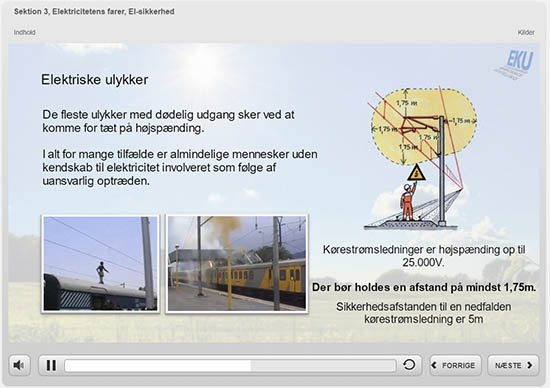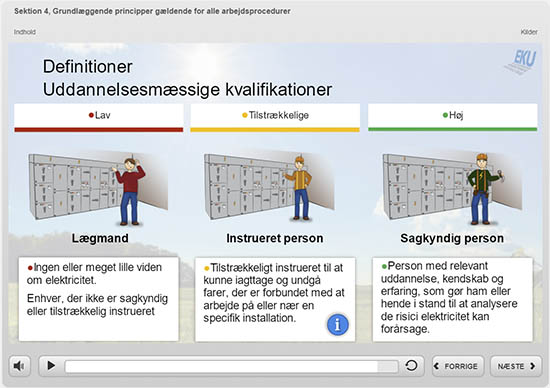DBI Guide 10:2021 / Course Edition 2023
Hot Work
2 – 3 hrs
Course length
45 Days
Access
Price excl. VAT
Hot Work – Heat and Spark Producing Tools
Online E-Learning Course
DBI Guide 10:2021, course edition 2023 - Language: 
Mandatory safety course for anyone who will be performing work with heat or spark-producing tools, or where flames, sparks or flammable heating is generated - commonly referred to as HOT WORK (the course does not cover hot work related to roofing and weed burning)
Hot work is the cause of many fires, including some of the largest and most expensive fires. Anyone working with tools that pose a risk of flammable heating should be instructed and trained to acquire the skills and routines to ensure that the necessary precautions are taken to avoid the risk of fire. Hot work training is a mandatory requirement included in the terms and conditions of most insurance companies. In addition, a rapidly increasing number of companies require suppliers to be generally qualified to perform hot work.
Dansk Branteknisk Institut (DBI) (The Danish Institute of Fire Technology) has compiled requirements from several stakeholders, in the Fire Technical Guide 10, each of which sets requirements for ensuring against the starting of a fire. To ensure continued cooperation, the executing company should, on its own initiative, ensure that work does not cause a fire and subsequent loss of production or value.
The primary goal of the course is to provide performers with the knowledge to identify risks and take necessary precautions.
This course, developed by DBI-Certified instructors, is equivalent to a DBI-course, provided the student is also trained in the practical use of hand-held fire extinguishers, which may already be gained in other ways. The insurance industry has put special focus on this area. The insurance companies' trade organization (F&P), which includes virtually all insurance companies in Denmark, encourages their members via "sikringssguiden.dk/varmt arbejde" (safety guide/hot work) to require, in their insurance terms and conditions, that contractors and others who perform work where there is a risk of flammable heating must be educated and trained to perform hot work. The safety guide prescribes that the course must be equivalent to a DBI hot work course. EKU's hot work course complies with these requirements - excluding the practical use of a hand-held fire extinguisher.
"Craftsmen and others who use tools that may involve a risk of flammable heating, often have a professional focus, and thus less focus, on the risk of flammable heating.
Should a fire occur because of work performed, damage will often be covered by insurance. If the fire is caused by hot work, a significantly higher Self-risk will generally be charged, if the work was carried out without having undergone education and training in "hot work".
Fire will often cause many, perhaps unbeatable, practical, and financial inconveniences. It therefore makes sense for both the company ordering the work and the contractor to ensure that the employees involved are educated and trained to be aware of the risks and to take precautions against fire.
The course participant gains knowledge of the requirements that apply:
• a common understanding of the roles that may be associated with the work,
• risk assessment,
• fire watch requirements,
• how hot work should be planned and carried out, and
• knowledge of fire and firefighting, including alerting, evacuation, extinguishing equipment, and usability.
The course covers both rules and different work situations so that the participant becomes familiar with the precautions to be taken in given situations.
The course is structured with text, speak, images, video, and tests, each of which contributes to understanding the content.
Practical use of hand fire extinguisher:
EKU's hot work course is equivalent to a DBI course in hot work - excluding practical use of a hand-held fire extinguisher which is often achieved by other means.
Training in the practical use of hand-held fire extinguishers is widely offered and can e.g. be in the form of an education or supplementary education, from public or private providers, which includes the practical use of handheld fire extinguishers (basic firefighting, emergency fire extinguishing, GWO Fire Awareness, practical firefighting training etc.).
EKU's course certificate is a fully valid "equivalent DBI Certificate", together with a certificate for practical use of a hand-held fire extinguisher.
Developed by certified DBI Instructors:
To be equivalent to a DBI course in hot work, the instructor must be an approved DBI Instructor.. EKU also fulfils this requirement.
Certificates / course certificates:
The course ends with a multiple-choice test, which must be passed with min. 80% correct answers. Once the test is passed, a course certificate is issued automatically.
Course certificates are issued in Danish and English - in A4 and credit card format.
Course certificates are sent to the e-mail address provided by the course participant and, if provided, to the customer administrator (CM).
Together with a certificate of practical use of hand fire extinguishing equipment, the certificate is equivalent to a DBI-certificate.
Registration / purchase of courses/courses:
Purchase/enrolment of course participants is done by selecting " buy" on the website.
When " buy" is selected, a buy / enrolment process is initiated where it is possible to purchase one or more courses.
If "private" is selected, access to the course can be obtained immediately, with a minimum of information and secure payment via credit card.
If it is a corporate purchase, select "Company". When buying as a company, the contact person is set up as a manager (CM) for the company. The CM has access to a range of service facilities. When the purchase is completed, an email is sent to the CM with instructions on how to log in.
Data on the course participant(s) is then provided in the form of name and email. It is a prerequisite that each student has their own unique email. The checkout is completed by selecting whether payment is to be made by credit card or by invoice (use of the same e-mail address for several course participants can be done only by sending an e-mail to tilmelding@eku.dk).
The course participant(s) will receive an email with a link to the course and can start the course immediately.
Discounts when buying multiple courses:
EKU provides a discount when multiple courses are bought in one order. The discount is automatically calculated and deducted based on the number of courses purchased.
Company Manager (CM)
As a CM, you gain access to the following services on EKU's platform:
1. ADD TRAINEES: Just like during checkout, trainees can be enrolled without having to fill in order details. We've streamlined the enrolment process to make it easier.
2. OVERVIEW OF LEARNERS. Track the progress of your enrolled learners. See if they have started the course and how much they have left to complete.
3. CERTIFICATE PANEL: After learners have completed a course, you can download and review their certificates directly on our platform. Our certificates support multiple languages as standard.
4. FAST HELP FOR YOUR STUDENTS: You have the option to extend a COURSE PARTICIPANT by 2 days for FREE if they haven't completed it on time. Alternatively, you can offer a 30-day extension for an additional fee. Everything happens instantly with no waiting time.
5. YOUR COMPANY OVERVIEW: Utilize the Company Manager (CM) functions in collaboration with your colleagues and manage your team efficiently. The features are linked to your company profile, which is associated with the VAT/CVR number. There is no limit to the size of your team. Multiple company managers can be created and we're here to help you through the setup process.
Course reminders:
If the course participant has not completed the course with 14 days left in the course window, a reminder is automatically sent to the learner to set aside time for completion. If the course is still not completed with 7 days left, another reminder will be sent.
Annual reminders:
When it is close to a year since the course has been passed, and provided the learner has not re-enrolled, an annual reminder is sent that it may be time to renew the course. The reminder is sent to the course administrator or to the learner if no course administrator is registered.
Support:
Should the need arise for clarification of specific questions in connection with the course, the course participant can get these clarified by contacting EKU's support.
Requirements for the extent of instruction:
There is no concrete legislation that clearly prescribes the scope and duration of hot work instruction.
DBI (government-approved institute for fire and security) has, in DBI fire technical guide 10, specified several requirements, that are intended to create a common basis for performing craftsmen and others who must perform hot work. The guide specifies a "valid certificate" for training in fire protection measures for hot work.
The Insurance Companies' Association (F&P) has listed requirements for education and training on the website "sikringsguiden.dk/varmt arbejde":
• The course content must be equivalent to a DBI course,
• The instructor must be a DBI-trained instructor and have a valid instructor certificate.
EKU's courses comply with all requirements from DBI Guide 10, requirements and instructions from F&P sikringsguiden.dk as well as CFPA Europe's* training program and CFPA-E* Guideline no. 12:2023, Fire safety basics for hot work operatives.
*CFPA-E=The Confederation of Fire Protection Associations Europe
Instructional frequency:
There are no general requirements for the frequency of instruction. For example, DBI fire technical guideline 10 contains nothing specific about the frequency of instruction, but DBI states a validity period of 5 years. CFPA-E Guideline no 12:2023 also mentions 5 years as an example of validity.
EKU recommends that the course is repeated annually until a culture is established in the organisation that ensures an increased focus on fire hazards. This means that the risks of hot work are always taken into consideration when planning and performing work tasks.
Frequent repetition of hot work instructions reminds employees of the risks of hot work and the precautions that should be taken - including a reminder that the company has a focus on, and interest in, avoiding the risk of fire as much as possible - for the benefit of customers, suppliers, and other stakeholders.
When hot work is a natural implicit part of the planning and execution of tasks, you might consider reducing the frequency of instruction.
Additional instruction:
Additional instruction may be required for a particular work task.
Depending on the complexity of the installation, work and hazardousness of the work, more frequent training may be required. This is especially true when working on heritage buildings, where there are stricter requirements for fire safety.
Additional information:
We hope we have provided you with relevant information. If there are any topics on which you would like further information, please don't hesitate to contact us at support@eku.dk

